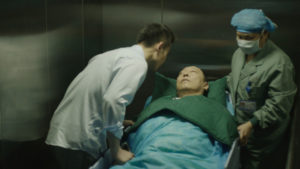Review: Wisconsin Film Festival
Wisconsin Film Festival continues at Sundance Cinemas through Thursday, April 6»
Jason Fuhrman shares his notes on Maria (and Everybody Else) and The Donor, two films screened during the opening weekend of the 2017 Wisconsin Film Festival.
 Maria (and Everybody Else | Nelly Reguera | Spain | 2016 | 96 min»
Maria (and Everybody Else | Nelly Reguera | Spain | 2016 | 96 min»
A vivid, intimate, sensitive, and charming character study, Maria (and Everybody Else) sweeps the viewer away with the grace and fluidity of a ballet. This remarkably assured and mature debut film suggestively portrays the interior world of a modern woman confronting her personal insecurities and relative stagnation as those around her are approaching significant milestones in life.
Brimming with verve and rich novelistic detail, Maria presents an extraordinarily lifelike picture of its eponymous heroine. Director Nely Reguera employs naturalistic shooting and peppers the film with playful touches of dry humor. While exuding a kind of blithe melancholy, it remains serious, but not too heavy, and never comes across as frivolous or overly sentimental.
A freeze frame perfectly captures the essence of Maria: although she is constantly moving, she seems to stay in the same place. Yet it also reminds us that self-actualization is always a work in progress. Maria announces an eloquent new female voice in Spanish cinema and represents a running start to what will likely prove to be a brilliant career.
 The Donor | Zang Qiwu | China | 2016 | 105 min»
The Donor | Zang Qiwu | China | 2016 | 105 min»
Another impressive directorial debut, Zang Qiwu’s The Donor offers a stark and uncompromising look at the gap between the haves and the have nots. This vital film presents an almost dystopian vision of contemporary urban China as it meditates on power, class conflict and the commodification of human life in a world of social disparity and economic instability.
Executed with surgical precision, The Donor employs static camerawork, meticulous pacing, sparse dialogue, and atmospheric sound design to expose the underbelly of advanced industrial society.
Ni Dahong stars as Yang Ba, a motorbike repair shop owner who is barely making ends meet. In order to pay for his son’s university entrance exams, he decides to sell one of his kidneys to Li Daguo (Qi Dao), whose sister suffers from renal failure. Yang’s defeated, world-weary face conveys a palpable sense of abject failure and desperation. His expression rarely fluctuates in the beginning, except when he receives the long awaited phone call regarding a lucrative opportunity. Li, on the other hand, is charismatic, amiable, and handsome, as well as impeccably dressed every time he appears.
The script relies largely on nonverbal communication, pregnant pauses, and expressive silences, while tending to omit narrative exposition. This minimalist approach encourages a contemplative viewing experience, and heightens the emotional impact of many scenes as we comprehend the nature of a situation.
In lieu of a musical score, the ambient soundtrack provides a subtle, yet powerful, background accompaniment to the tense drama that gradually unfolds. For example, when Li first tries to persuade Yang to give up one of his son’s kidneys after his own is rejected, the sound of a train rumbling by on the tracks above becomes increasingly amplified and echoed to striking effect.
Although Yang is clearly the protagonist, he does not really act like a hero. He resorts to extreme measures for the benefit of his wife and son. He listlessly shuffles through life without any passion, conceals his dubious dealings from his family, and only becomes animated when he is up against the wall.
Conversely, Li is calculating, manipulative, and determined to get what he wants at any cost, but he is also sincerely devoted to his terminally ill sister. Li is not so much evil or callous as he is blind to his arrogance and privilege.
The fundamental difference between these two characters becomes painfully clear when they are conversing in a hospital room before the surgery. Li asks Yang who the most important person in his life is. Apparently disconcerted by the question, after a long pause, he flatly replies: “If my wife and son don’t give me any trouble, I’ll be happy.”
Qiwu ultimately delivers something much more complex and thought-provocative than a mere scathing indictment of a socioeconomic system that compels disadvantaged people to illegally sell their organs. The power of the film derives from its moral ambiguity. While The Donor operates as a microcosm of the world we inhabit and a timely, highly charged tale of exploitation, it also raises a difficult question: how can the value of human life be quantified?